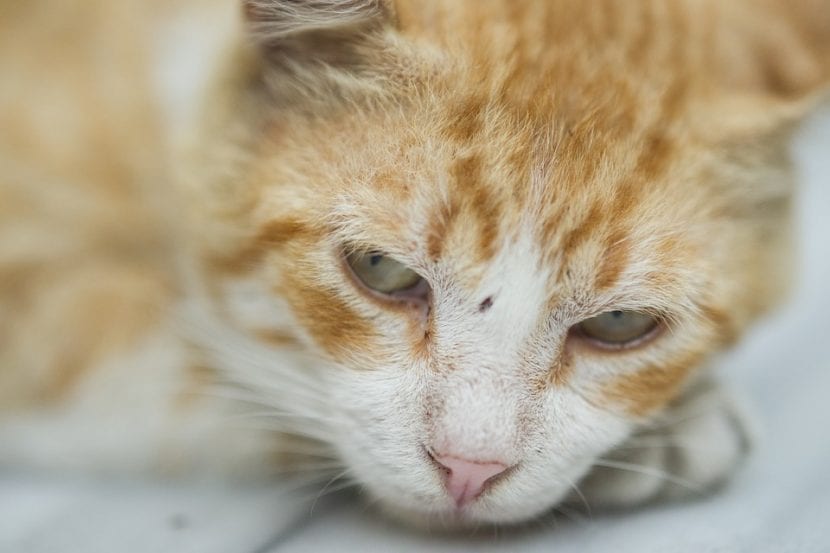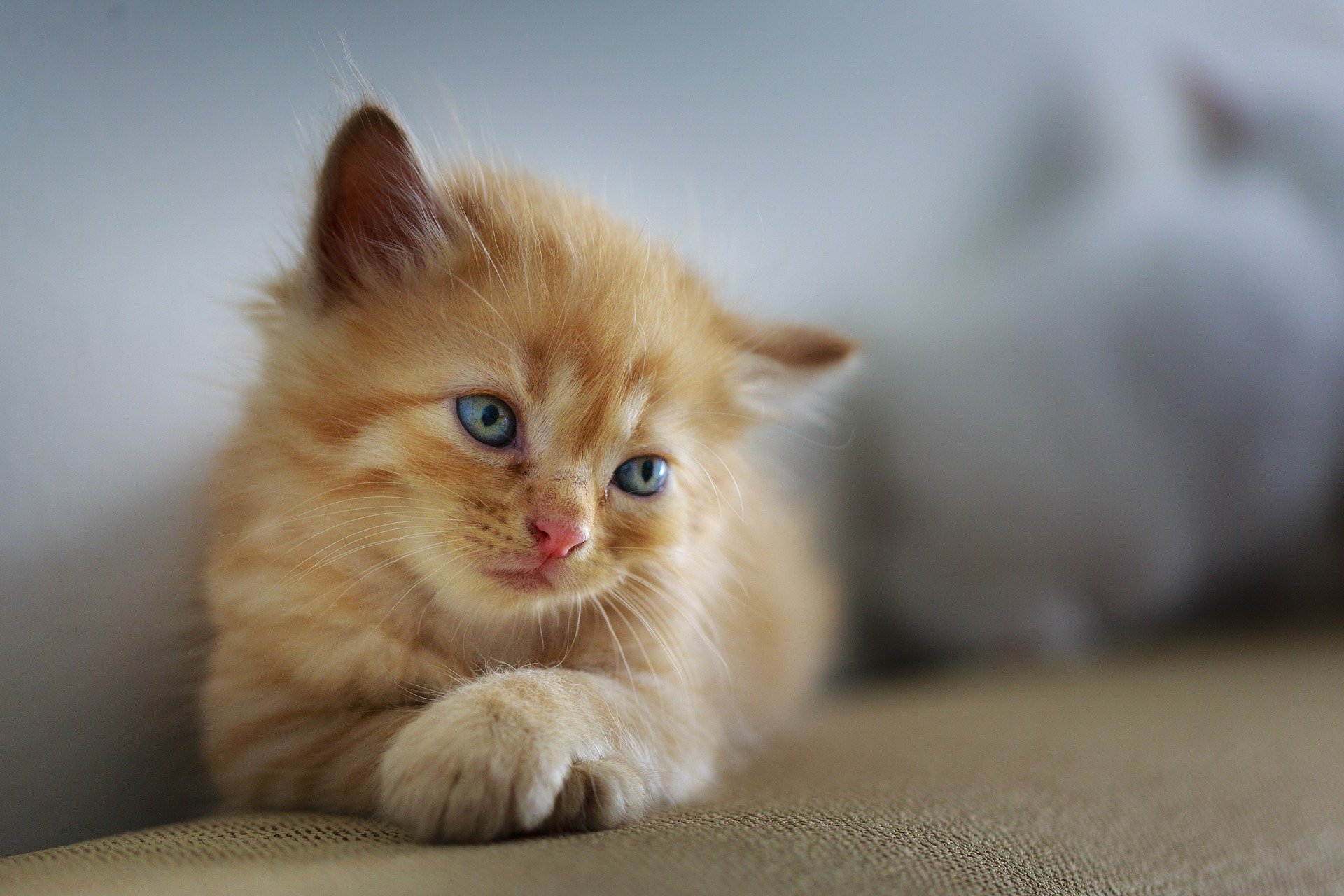
When a kitten is born it depends on its mother for everything: to keep warm, eat and also to relieve itself. If the little one is unlucky enough to be left without his mother, or if she is a newcomer and rejects him, then it will be the human who has to place him in a comfortable bed and away from drafts, give him his bottle every 2-3 hours , and stimulate the ano-genital area with gauze or toilet paper moistened with warm water to urinate and defecate. But, What if our friend is already an adult and has trouble going to the bathroom?
Helping him will be more difficult, but we can do several things. Let us know how to help a cat urinate and when should we go to the vet.
Why can't my cat urinate?
There are several reasons why a cat stops urinating, which are:
- The litter box is dirty and / or in a very noisy or busy room: it is important to remove urine and feces every day and clean the tray thoroughly once a week. Also, it will be necessary to put her in a quiet room, away from her food and water.
- Hair balls: Especially if you have long hair or during the shedding season, if too much is swallowed, this accumulation can cause constipation and urination problems. To avoid this, we must brush it daily and give cat malt once a day.
- Urinary tract obstruction: the bladder of a healthy cat has the consistency of a half-filled water balloon, but if it is ill when palpated, it will feel hard and firm, similar in size to that of a tangerine.
What can we do to help you?

In addition to what we have already commented, it is very important to give them a quality diet, without cereals or by-products, since these are ingredients that not only cannot digest well but can also cause you many problems, such as the disease of the cystitis.
To make sure you drink enough water, It is advisable to buy a fountain type drinker, or to give him wet food (cans). In this way, your urinary tract will remain properly hydrated, thus preventing the formation of kidney stones and the appearance of infections.
Another thing we have to do is ensure that it is calm. The cat is an animal that tolerates very little Stress. Any change in your life, from a change in the arrangement of the furniture to a move, they can harm you. Therefore, we have to give him a lot of love (without overwhelming him), and spend time with him.
How long can a cat go without urinating?
It is a natural fact that all mammals have to urinate. Defecating can wait, in fact you can spend several days without doing a belly, but urinating is right up there with breathing on the list of important things to do every day. So when something blocks the passage of urine, health problems come too quickly.
Urination is necessary to purify the body, the kidneys help adjust the composition of body fluids and dump the excess into the urine. Urine is (generally) sterile, unless you have a urinary tract infection (UTI), the urine is pure enough to be able to cleanse your body.
When you don't urinate, problems come. If the flow of urine stops, those waste products build up and start causing problems. One of the most common ways this occurs is when a cat's urethra (the tube that carries urine from the bladder to the litter box) becomes blocked. It is a poorly understood disorder seen with alarming frequency in veterinary hospitals and emergency rooms. Failure to urinate can be a serious problem that requires immediate treatment.
Understand the causes
The actual plug that stops the flow can be made from bladder stones (often mistakenly called kidney stones), tumors, or a mixture of mucus and protein known as 'matrix' that has the consistency of toothpaste. In addition to the confusion, the name of the disorder has changed no less than four times in the last 20 years from feline lower urinary tract disorder to feline urological disorder to feline interstitial cystitis, and to the most recent envelope of Pandora syndrome. They are the same name for the same problem.
This problem has been implicated in many other factors, such as stress, lack of access to water, diet, infectious agents, indoor lifestyle, and many others., as responsible for the period prior to the blockade. Those little plugs don't form in a vacuum; something is causing them and we do not know which factor or factors contribute with great certainty.
Cats that cannot urinate often show the following signs:
- Going repeatedly to the litter box (often mistaken for constipation)
- Crying or howling
- Licking the genitals / under the base of the tail
- Concealment
Look for a solution as soon as possible

If you notice that your cat is showing any of the above signs, see your vet or go to the nearest emergency room as soon as possible. Do not be late. A few hours can make a big difference - you don't want those toxins to circulate for too long, and the longer it is not controlled, the more pain the cat experiences, the more work the vet has to do and the higher the final bill you will have to pay.
In advanced cases, where the flow of urine has stopped for more than 24 hours, they may become systemically ill from the retained toxins and begin vomiting, or they may become very weak and lethargic. Death generally occurs within 48 hours, and it is not a pleasant path.
The pain with this disease is immense. The course after helping these cats is as unpredictable and mysterious as the factors that lead to the obstruction; some cats are discharged from the hospital never to suffer another episode, while others will have repeated days, weeks, or years later.
Managing these cases medically can go beyond relieving the obstruction in some cases. The first priority is to fix the plumbing problem: get the pee flowing. This is usually done with anesthesia and a catheter to remove the blockage..
Deadly potassium disorders, elevated kidney values, and severe dehydration can mean days in the hospital, even long after urine flows again. It can get complex, expensive, and wear out even the most committed homeowner.
Getting them back together, urinating again, and going home is the easy part.. Following this, there are lifestyle changes, medication adjustments, medical check-ups, and diet changes that can conspire to spread the initial complexity of this disease over months or years.
Today cats with this disease go home and get better, and even in difficult cases they can get better. The ideal is to be able to prevent this disease and that there is always a quick treatment.
If our cat goes more than a day without urinating, we must urgently take him to the vet. Your life could be in serious danger.
